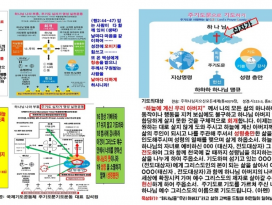내가 기도할 이유, 나눔 공동체
III. The Fifth Petition
“Forgive our debts as we forgive our debtors”
The fifth petition of the Lord’s Prayer is “forgive our debts as we forgive our debtors.” This teaches forgiveness of sins. The Greek words for this phrase can be translated such as, ‘in the past we failed to forgive those who sinned against us, but from now on, forgive us that we may be able to forgive our debtors.’ A human’s most urgent and practical need is daily bread. The most urgent spiritual need is to be forgiven. It is as practical as our prayer for daily bread. The prayer, “forgive our debts” is a foundation of our life as Christians, a principle of being spiritually born again, and the root of faith to be sanctified after receiving salvation. One of the instructions of Jewish Rabbis is ‘forgive your neighbours’ faults.’ As we ask for our daily bread everyday, we should ask everyday for the forgiveness of our sins. “Deliver us from evil” is a prayer for the future and “forgive us” is a prayer for the past. The Westminster Confession of Faith explains what we are actually asking when we pray for our daily forgiveness. “The fifth petition of the Lord’s Prayer is ‘forgive our debts as we forgive our debtors.’ It is a prayer that asksfor forgiveness through Jesus Christ without we ourselves paying price. We ask for his forgiveness even boldly because we forgave others by his grace.” As it is important for us to ask for our daily needs, for our physical well being it is also important for us to ask forgiveness for our spiritual well being. These two prayers are closely related.
1. Why does the fifth petition start with the word, “kai (and)” not like previous petitions?
The word, “and” is used at the fifth petition for the first time in the Lord’s Prayer. The Korean revised version did not translate the word. That is, “Give us this day our daily bread (and) forgive our debts as we forgive our debtors.” The First three petitions are related to each other and yet they are clearly separated. However, the fourth and fifth petitions are closely related to one another.
1) Asking for daily needs is realistic and practical for human beings. Receiving forgiveness of sins is also necessary for spiritual needs. So these two petitions are each practical in humans’ lives. The most urgent needs in human life are food, drink, clothing. But, Jesus taught usnot to worry about the earthly things, “So do not worry, saying, ‘What shall we eat?’ or ‘What shall we drink?’ or ‘What shall we wear?’ ” (Matthew 6:31). Jesus taught us to ask first for his kingdom and righteousness, our spiritual daily food (Matt 6:34). This means that both physical food and spiritual food are closely related to one another. The physical needs are most the urgent things for humans and they are often addressed before Spiritual needs. Spiritual needs are address and related to our confession of sins.
2) Without forgiveness of sins, even though we have many valuable things, they are not useful to us. We need to pay our attention to Matthew Henry’s words, “if we do not receive forgiveness for our sins, daily food only makes us get fat like sheep that
eat and are then killed.
3) Our sins are obstacles those block blessings, daily food and daily needs from God. Whenever we pray for God’s blessings, we should pray “and forgive my debts.”
4) Daily food meets our appetite and forgiveness of sins satisfies our soul conscientious.
5) Daily food gives us a confident life and forgiveness of sins lead us to die in to confidence.
6) Both the fourth and fifth petitions are related to the present and the future time when there will be completion of the kingdom of God.
2. About the sin in Matthew and Luke of the fifth petition.
1) How does the Greek describe sin?
First, the word ofeilhma means debt rooted from “did not do duties” (Rom 4:4).
Second, the word amartia (hamartia) means missed the target rooted from “did not live according to the good will and did not meet the will of God” (John
143 페이지
word ‘paraptoma’ means sleep and fall rooted from “sins with carelessness” (2 Cor 5:19). Fourth, the word ‘anomia’ means illegal rooted from “sins consciously” (Rom
2) How do Matthew and Luke record sin in Greek?
The book of Matthew used the word ‘ofeilma’ and Luke used the word ‘amartia’ (hamaltia). Since Matthew was written for the Jews, he used the Aramaic word ‘ho-o-ba’ which means debt to indicate ethical and religious duties between men and God. On the other hand, Luke, since he focused on the Gentiles, used the word ‘hamartia’ which means missed the target that is familiar to the Gentiles. These words have different roots but their meanings are same.
3) Why is the word for sin use a with the word for debt?
The parable of the debtor in Matthew 18:23-35 is related to the Lord’s Prayer. This parable has the same principle as the Lord’s Prayer. One master canceled one of his servants’ debts, ten thousand talents. However, this servant did not cancel the debt of
a man who owed him a hundred denarii. There is a relationship between debts and sins. That is, sins are debts and all sinners are debtors. Sin was compared to a thousand talents (Matt.
What is the characteristic feature of sins as debts?
(1) Debt of sin cannot be denied. Other debts can be denied.
(2) Debt of sin cannot be avoided. Other debts can be avoided.
(3) If there is no forgiveness of debts of sin, he/she is bounds in eternal death. If a debtor cannot pay his debt, he can be imprisoned. If you cannot pay the debt and interests, you can be imprisoned for the rest of your life.
(4) We do not know the amount of debts of sins we owe God. The word “debts,” of the Lord’s Prayer is plural. We owe God debts above debts. We sometimes do not know how much debt we owe God.
(5) Sins and debts hate God. A wicked debtor can easily hate the creditor. The debtor wants his creditor to disappear away from him.
(6) Those who have debts of sins are fearful and fearful. Debtors are nervous and fear that they may be arrested. Spiritual debtors live in hope that they can be freed from their debts.
4) How are we to understand the relationship between us and God regarding debts in the Lord’s Prayer?
God is the creditor and we are the debtors. Jesus Christ paid our debts and became our guarantor. A parable in Luke describes God as a creditor (Luke
5) How can we pay our debts?
We have to confess our sins honestly. When we confess our sins, God forgives all our sins (1 John
3. What does “forgiveness of sins” mean in the fifth petition of the Lord’s Prayer, “forgive our debts”?
Forgiveness of sins is the first blessing and one of the first mercies that God has given us. God pretends that he did not see our sins and he cures our wounds of sins and cleanses our filthy sins. Since Jesus paid the price for our sins, God will accept us as his children, he willsanctify us and crown us in his kingdom.
1) Who forgives our sins?
It is only God. Forgiveness is the special right of the King of kings (Mk. 2:7). It is so obvious that God only can forgive sins. Only the creditor can cancel the debt.
2) About the right of forgiveness
How does the bible identify the sphere of ministers’ commission? Ministers cannot authoritatively and effectively release sins, but only by declaration. They only have the right to apply the promise of forgiveness of sins to those who are wounded by their sins. They cannot forgive their sins. They can just proclaim that Jesus Christ forgives a person’s sins as messengers. They were not given the authority to forgive sins.
3) About the definition of forgiveness
(1) It means to take away oftenses.
Job said, “Why do you not pardon my offenses and forgive my sins? For I will soon lie down in the dust; you will search for me, but I will be no more” (Job
(2) It means to blot it out.
Isaiah said, “I, even I, am he who blots out your transgressions, for my own sake, and remembers your sins no more” (Isaiah 43:25). The phrase “blot out” means a that creditor cancels all the debts and give a certificate of cancellation when it has been paid. When God forgives our sins, likewise, he blots out our sins and draws a red line over our sins with the blood of Jesus Christ.
(3) It means to cover it up.
“You forgave the iniquity of your people and covered all their sins” (Psalm 85:2). It means that Christ covered our sins.
(4) It means that God cast our sins into the deep sea.
This means that sins will be buried in the deep sea so that sins cannot come out to judge us. “You will again have compassion on us; you will tread our sins underfoot and hurl all our iniquities into the depths of the sea” (Micah
(5) It means that God scatters our sins like clouds in the sky.
“I have swept away your offenses like a cloud, your sins like the morning mist. Return to me, for I have redeemed you” (Isaiah 44:22). God scatters the clouds of sins so that the light of his face can come through.
4) What characteristics does forgiveness include?
(1) Forgiveness allows the avoidances death.
What is the price of sin? It is death (Rom.
(2) Forgiveness is God’s grace and we receive it by grace.
God forgives us as a creditor who freely cancels debts. Our prayers, tears and good deeds cannot buy forgiveness. When the magician Simon wanted to buy the gift of the Holy Spirit, Peter said, “Peter answered: ‘May your money perish with you, because you thought you could buy the gift of God with money!’ ” (Acts
(3) Forgiveness is through the precious blood of Jesus Christ.
The blood of Christ is the physical material matter that allows us to properly receive the forgiveness of sins. “In him we have redemption through his blood, the forgiveness of sins, in accordance with the riches of God's grace” (Ephesians 1:7). Only the blood of Jesus Christ, that hasthis unlimited value, can forgives our sins.
(4) Sins cannot be forgiven unless we ask for forgiveness.
It is “repentance and forgiveness of sin” (Luke 24:47). There are three important factors of repentance including contrition, confession, and conversion. They have to occur before the forgiveness is given. The first factor of repentance is contrition. The bible described contrition as, “All who survive and escape will be in the mountains, moaning like doves of the valleys, each because of his sins” (Ezekiel 7:16). The moaning is often described as beating one’s breast (Lk 18:13) and flooding one’s bed with tears (Ps 6:6). However, all these actions are not repentance. Ahab tore his clothes but his heart was not torn. The second factor of repentance is confession. “Against you, you only, have I sinned and done what is evil in your sight” (Psalm 51:4). The confession has to be made only to God. It has to be made freely, honestly and truly. This opens a way for the forgiveness of sins. The third factor of repentance is conversion. This is to turn away from our sins. It has been said, “Rid yourselves of all the offenses you have committed” (Ezekiel
(5) Through the forgiveness of sins, God cancels the price that we would pay for our sins and the punishment that would suffer.
When the price of sins was cancelled, the punishment of sins was cancelled too. The children of God can cause God’s wrath even after they are forgiven. But the legal wrath of God was taken away. God’s discipline would be there, but there would not be God’s punishment. The discipline can be on the children of God, but not the punishment.
(6) God does not remember my sins after he forgave them.
“No longer will a man teach his neighbor, or a man his brother, saying, 'Know the Lord,' because they will all know me, from the least of them to the greatest” (Hebrews 8:11).
(7) Forgiveness does not depend on the quantity of sins.
God destroys such sins that appearas dark clouds, scarlet and black as black ink (Isaiah 44:22). A king in a parable of Jesus cancelled his servant’s debt who owed him ten thousand talents (Matt 18:27).
(8)There are unpardonable sins.
The Scripture mentions these sins,first, “but the blasphemy against the Spirit will not be forgiven (Matthew 12:31),” second, “but anyone who blasphemes against the Holy Spirit will not be forgiven (Luke 12:10)” and third, “and who has insulted the Spirit of grace? (Hebrews 10:29).” So, the blasphemy against the Spirit, blasphemes against the Holy Spirit, and the blasphemy against the Spirit cannot be forgiven. It is not because God’s mercy is not enough to forgive theses sins, but because those who committed these sins do not want to be forgiven.
(9) Future sins are not forgiven until they are repented of.
When God forgives sinners, he forgives all sins. “I will cleanse them from all the sin they have committed against me and will forgive all their sins of rebellion against me” (Jeremiah 33:8), “When you were dead in your sins and in the uncircumcision of your sinful nature, God made you alive with Christ. He forgave us all our sins” (Colossians
(10) Our faithful attitude toward God comes before the forgiveness of sins.
The faith necessarily comes before forgiveness of sins. “All the prophets testify about him that everyone who believes in him receives forgiveness of sins through his name” (Acts
(11) The forgiveness of sins is commissioned by the Holy Spirit.
The Holy Spirit notifies his people two ways of the forgiveness of sins. One is internal and the other is external. He does this because of the human’s double nature. The Holy Spirit who dwells in the hearts of the saved inwardly lets them know by spiritually. However, in life, there arise many desires and pride. Outwardly, the Holy Spirit lets the people know about the forgiveness by proclamations through brothers and sisters who have been commissioned by the holy authority of the church.
(12) Forgiveness is by fellowship.
Those who are saved should have fellowship with the saved. This true fellowship happens in the light of life (1 John 1:7). There is an important slogan of spiritual faith. It is where there is no fellowship, there is no victory. As we need to have a living relationship with God, we ought to forgive our sisters and brothers. Apostle Paul emphasized the fellowship toward the Corinthian church, “Now instead, you ought to forgive and comfort him, so that he will not be overwhelmed by excessive sorrow. 8 I urge you, therefore, to reaffirm your love for him. 9 The reason I wrote you was to see if you would stand the test and be obedient in everything. 10 If you forgive anyone, I also forgive him. And what I have forgiven-- if there was anything to forgive-- I have forgiven in the sight of Christ for your sake” (2 Corinthians 2:7).
%%%%%%%%%%%%%%%%%%110804……………기도신학153페이지
4. What is the relationship between the forgiveness of God and us forgiving our neighbours?
Which one is the first? Which one depends on which? It means what is the relationship between the horizontal and the vertical. To understand this fifth petition, we need to know the following facts. The fifth petition is about sins that are already forgiven. That is, this petition emphasizes attitudes of those who received forgiveness in Christ when they ask forgiveness of their sins before God. The prayer of Jews emphasizes the right condition to ask for forgiveness. However, the Lord’s Prayer emphasizes how the people of God should stand before him when they pray. I will look at what this petition teaches and emphasizes while considering the facts I have discussed. The fifth petition emphasizes that the forgiveness of God and the forgiveness among ourselves cannot be separated. The second part of the fifth petition, “as we forgive our debtors,” emphasizes that our prayer for forgiveness and our forgiveness among us are parallel. That is, it does not mean that the second part is the condition that makes possible the first part. It teaches that how those who seeks God’s forgiveness should stand before. The parable of a wicked servant in Matthew 18:21-35 is the best parable of this. Through this parable, Jesus first teaches that the people of God are like the servant who is not able to pay his debts, ten thousand talents, but our debts are cancelled by the abundant grace of God. Second, it emphasizes that those who received God’s unlimited forgiveness should practice this forgiveness in their lives. It also emphasizes that, if not, God’s righteous judgment will follow after them. So, Christians in the New Testament era should recognize their own perfect righteousness and salvation through the fifth petition. They should also recognize that they need God’s grace and forgiveness until they enter into heaven. They should repent daily in their lives. They should also reflect the forgiveness of God toward others and further a forgiving world.
5. Why do we have to ask for forgiveness?
1) Because a prayer for forgiveness is the foundation of all prayers and, of sanctification, we need to ask for forgiveness daily as we ask for food daily.
The word for sin, as has already mentioned, are “debt” in Matthew and “miss the target in Luke. The original meaning of the fifth petition is “as we daily forgive our debtors today, forgive us daily.” Alexander Macglaren said, “God created us to need bread and we were also created to need daily forgiveness. As we daily live in great need of bread, we live in great need of God’s forgiveness. Even as we have enough bread for they, we need to be forgiven daily.
2) Because God forgives regardless to how big or small sins are.
God removed sins as far as from the east to the west (Ps. 103:12), “Though your sins are like scarlet, they shall be as white as snow; though they are red as crimson, they shall be like wool” (Isaiah
3) Because the root of Christians’ faith began with the forgiveness of God.
Sinners were forgiven and saved by the faith in Christ (Rom. 1:17), God assured his love for us in Christ who died for us while we were sinners (Rom. 5:8), therefore, there will not be any judgment for those who are in Christ (Rom. 8:1), no one can separate us from the love of God in Christ (Rom. 8:39) and call to God who forgives as Abba Father (Rom. 8:15).
4) Because it leads Christians to bear the fruits of the Holy Spirit by the daily experience of joy and peace which come from the forgiveness.
Sinners who have not received forgiveness live uncomfortable lives. They are afraid of thunder, the sound of leaves of weeds as they go pass by, the wind, and they live in fear, sadness and suffering. The apostle John said, “fear has to do with punishment” (1 John 4:18). The Greek word for torment, ‘kolasis’ is often used for hell. Fear has hell in it. Debtors who are not able to pay the debts live in fear of being arrested. Sinners who have not received God’s forgiveness, live their lives in fear of death. However, sinners who received the forgiveness live in joy with the deep grace of forgiveness.
5) Because when Christians do not forgive and live abusive lives, it cause disadvantages in their lives.
The Psalmist confessed the cost of not to prohibiting ; “He loved to pronounce a curse-- may it come on him; he found no pleasure in blessing-- may it be far from him. 18 He wore cursing as his garment; it entered into his body like water, into his bones like oil” (Psalm 109:17). Forgiveness is a healthy medicine that cures the disease of curses. When you do not forgive others, it is you who mostly suffers. When we bless those who we have difficulty in forgiving and ask first for forgiveness, can have live both spiritually and physically healthy lives (John 3:2). “Bless those who persecute you; bless and do not curse” (Romans
“Do not repay evil with evil or insult with insult, but with blessing, because to this you were called so that you may inherit a blessing” (1 Peter 3:9). “Without love, unforgiving, slanderous, without self-control, brutal, not lovers of the good” (2 Timothy 3:3). Forgiveness is to be released from anger and accusation. One who has deep anger in his heart cannot enjoy sound sleep and may lose peace and lose health. One should have a heart that can forgive and reconcile. Spiritual healing is related to the forgiveness of sins. Forgiveness is a way to keep one’s own health and after forgiveness it is possible to have healthy relationships.
6) Because forgiveness is to keep the commandment of Jesus, “love your neighbours as yourselves (Matt.
The Apostle John said, “If anyone says, "I love God," yet hates his brother, he is a liar. For anyone who does not love his brother, whom he has seen, cannot love God, whom he has not seen” (1 John 4:20). Love is like a fruit of the forgiveness tree.
7) Because we are obligated to forgive those even we have difficulty forgiving.
We all are like the one who owed God ten thousand talents. So we have to forgive those who owe us even a small amount.
6. Why do not you ask forgiveness of your sins? Why do not you ask forgiveness and yet asking forgiveness of sins is necessary?
1) Because of the lack of assurance of forgiveness of sins.
We need to have the assurance of forgiveness of our sins that our sins will be erased from our conscience and God’s record. The assurance becomes a way to peace in the heart and to be able to approach God. “For I am convinced that neither death nor life, neither angels nor demons, neither the present nor the future, nor any powers, 39 neither height nor depth, nor anything else in all creation, will be able to separate us from the love of God that is in Christ Jesus our Lord” (Romans
2) People who are in despair do not want to ask for forgiveness of sins.
They say that God will not forgive them because their sins are too big and wicked. But it is the same as “But they will reply, ‘It’s no use’ ” (Jeremiah 18:12). Despair is like cutting an artery that deads to hope. Satan manipulates our sins and leads us into despair to accuse us. The position of despair bears the judgment in the spirit that one’s sins cannot be forgiven by the blood of Christ.
7. What can I do if the opponent does not want to receive forgiveness and refuses to receive it to the end?
The Scriptures teaches us to encourage those. What is the character of encouragement?
1) It is to build encouragement and comfort. “…encouragement and comfort…” (1 Corinthians 14:3).
2) It is not to trick. For the appeal we make does not spring from error or impure motives, nor are we trying to trick you” (1 Thessalonians 2:3).
3) It has to be a sound doctrine. “So that he can encourage others by sound doctrine…” (Titus 1:9).
4) There may cases for us to encourage once or twice and then leave. “Warn a divisive person once, and then warn him a second time. After that, have nothing to do with him” (Titus
8. How should we forgive?
We should look for how God forgives us. Forgiveness is possible when we learn Jesus’ forgiveness in the grace of God and the power of the Holy Spirit.
1) Forgive continuously.
When Peter asked Jesus about forgiveness, Jesus answered, “I tell you, not seven times, but seventy-seven times” (Matthew
2) Forgive with a true heart.
“This is how my heavenly Father will treat each of you unless you forgive your brother from your heart” (Matthew
3) Complete forgiveness.
As the forgiveness of God is perfect, our forgiveness should be perfect too. Our forgiveness should not be conditional. The bible says, “Who forgives all your sins and heals all your diseases” (Psalm 103:3). The Greek word for forgive in “as we forgive our debts” is as same as the Greek word used in Matthew 4:22. James and John left boats and nets to follow Jesus when Jesus called them. The word that means left was used in the Lord Prayer. Forgiveness means to leave, to throw away. When we put the waste into the trash, we just toss it. Without forgiveness, the waste tha we do not throw away smells bad. When we keep the waste we cannot get rid of the smell. As when we dump the waste, we do it completely, we need to practice the same in forgiving completely. In fact, it is difficult to forgive completely. Our ability to forgive completely and continuously is limited by our continuing anger and weaknesses. It is difficult to carry unforgiveness. Learn God’s perfect forgiveness. Forgive as God forgave you. When you do this, you can overcome all these difficulties to forgiveing.
4) Forgive unconditionally.
Love is unconditional and does not seek own benefits (1 Cor. 13:5). “It always protects, always trusts, always hopes, always perseveres” (1 Corinthians 13:7). When forgiveness is built on this foundation, it is unconditional. When we ask for forgiveness we should walk inreconciliation and peace. When we try to forgive unconditionally the Holy Spirit teaches us to walk in it.
5) When we ask for forgiveness, our language should be honest, in the light without hiding anything.
We should be able to show our weaknesses to others as we confess our sins before God. When we ask for forgiveness, we should depend on the Holy Spirit and let him lead our words. When we ask for forgiveness, such words, “may be I did wrong,” or “if I did wrong” are not right. We have to confess honestly things that the Holy Spirit has convicted us were wrong. Therefore, we should not try to reduce or ignore our wrong doings. It is very common that we make excuses rather than being honest. For example, “please do not mind, its nothing,” “I did not know, that is why I did it,” or “never mind, do not worry” these are not for asking for forgiveness. We have to realize that wrong confessions or reducing others’ debts can make the opponents feel humiliated. That is, “I thought about our relationship and I found that I am not the kind of person you thing I am. It is true that I did wrong but you also did wrong,” or “If you were in my situation you would have done the same thing. I am glad that I did not do that much wrong. So do not worry too much,” are not the right things to say. When we depend on the Holy Sprit true forgiveness, we may be able to bear the fruit of forgiveness. When we try to avoid “A man who speaks in haste” (Proverbs 29:20), our request for forgiveness will be even more honest.
6) Thorn forgiveness is not forgiving.
What is thorn forgiveness? It is, for example, I forgive you because someone encouraged me to do so. But I will never forget that you hurt me.” This is not forgiving. D. L. Moody called this as “hedgehog forgiveness.” Matthew Henry said, “Many people look reconciled on the surface. Forgiveness does not have a hostile mind or bad feelings. It does not consider any revenge. It truly hopes the opponents will be blessed and have a joyful life.” Even though we reconcile on the surface with our opponents, if we do not do it from the center of our hearts it is hedgehog forgiveness.
7) Open the door of forgiveness with true understanding of others.
The word, “understand” means stand under. It means that standing on anothers’ side with a humble heart. When others are in a trouble, we often blame them without understanding them.
8) After forgiveness, forget all the other things that are difficult to forgive.
The reverend Spurgeon humorously demonstrated forgiveness. “Forgive and forget. When you bury a mad dog, you cannot leave its tail on the ground like a memorial tower.” What does it mean? I believe that in the old days, they buried mad dogs alive. When you bury the mad dog, you need to bury it all. You do not have to leave its tail unburied. When we forgive others, we have to forgive all without leaving anything unforgiven. There should not be anything left over that we choose not to forgive and forget.
9) Forgiveness is possible when we start to love by faith.
Christians should learn that forgiveness could be practiced by training to love in faith. Growing in faith is parallel with the capacity of faith. Romans 1:17 Says “For in the righteousness of God is revealed from faith to faith…”. Forgiveness is required in this polluted world. A true brave heart that could make people truly forgive others in love by faith is needed.
10) Forgiving others should be habitualized.
(1) Forgiving is necessary for a healthy spiritual life.
(2) Forgiving is an essential factor for expanding evangelism.
(3) Forgiving is necessary for Christian fellowship in Church.
(4) Forgiving is necessary for a successful marriage and healthy household.
(5) Forgiving is necessary for a powerful prayer life.
(6) Forgiving is necessary for life that is filled with the Holy Spirit.
(7) Forgiving is necessary to have a brave faith.
(8) Forgiving is necessary to a disciplined forgiving life.
(9) Forgiving is necessary to be filled with spiritual joy and thankfulness.
(10)Forgiving is necessary to grow in humility and gentleness.
(11) Forgiving is necessary to follow Jesus.
(12) Forgiving is necessary to reduce Satan’s scope.
Conclusion
The gospel of Christianity is the gospel that the love of God was fulfilled on the cross. The second petition for men is “forgive our debts as we forgive our debtors.” So far, we discussed where this petition is located in context, what sin is, why do we need to forgive, and how we are supposed to live and ask for forgiveness. Jesus gave his all to forgive sinners and Matthew 6:14 tells us how we are supposed to live, “For if you forgive men when they sin against you, your heavenly Father will also forgive you.” I did my survey on this petition for my theses. One of my survey questions was how Christians adopt this petition in their daily life? 67.2% of the participants gave positive answers to the question. According to this result, 3-4 out of 10 live their lives as far as they can be from God who forgives like Satan who hates. Satan who hates takes away Christians’ physical and spiritual health, destroys their families and snatches their faith and life that should be filled with the Holy Spirit. Satan’s fills them with sadness, nervousness, arrogance pride, and becomes a stage where Satan dances. However, when a christian forgives, Satan who came by one way will run away to ten different ways and the kingdom of God will be expanded. We need to ask for forgiveness daily as we ask for daily bread. We should live with pure, honest, and true hearts that and not feel like, “I feel so guilty to ask for forgiveness today.” All Christians want to pray this prayer of forgiveness without guilt. Honest faith can be measured by the practice of forgiveness in one’s daily lives in the present and the future.
기도신학174
| no. | 제목 | 작성자 | 조회수 | 작성일 | |
|---|---|---|---|---|---|
| 공지 |  | 주기도문기도운동 | 68476 | 2024년 9월 21일 | |
| 공지 |  | 주기도문기도운동 | 68435 | 2024년 9월 21일 | |
| 공지 |  | 주기도문기도운동 | 73291 | 2024년 8월 11일 | |
| 공지 |  | 엘리자베스여왕장례식주기도 [1] | 주기도문기도운동 | 75155 | 2024년 7월 25일 |
| 공지 |  | 주기도문기도운동 | 74878 | 2024년 7월 25일 | |
| 공지 |  | 주기도문기도운동 | 74819 | 2024년 7월 24일 |
